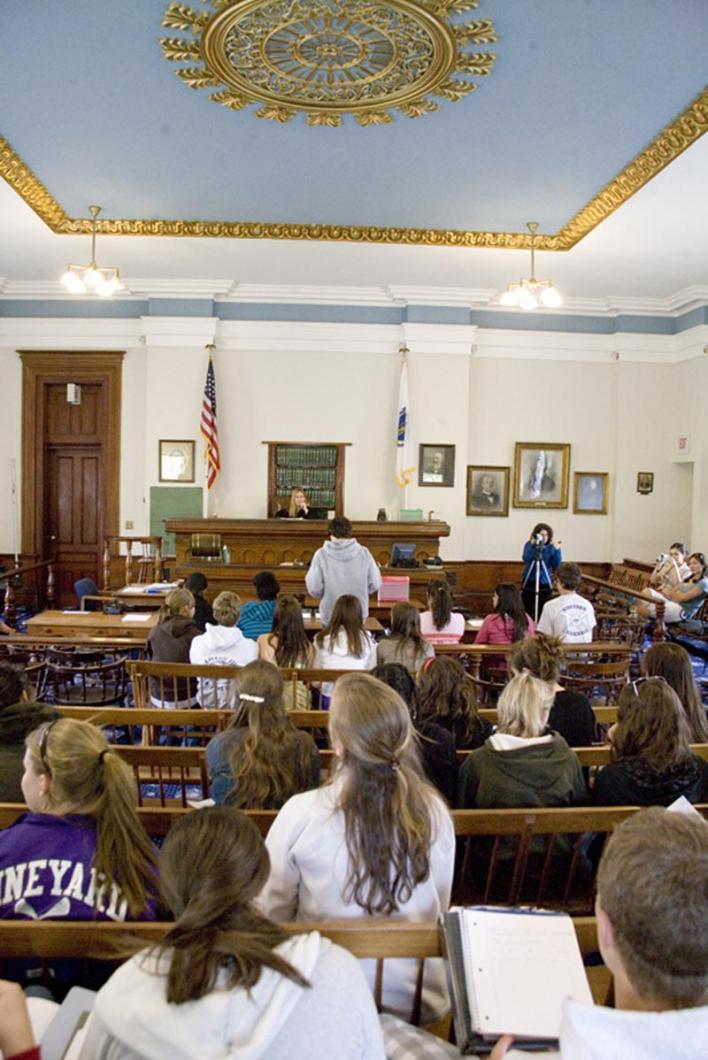The hubbub of non-English voices stilled and everyone stood for the entrance of clerk magistrate Liza Williamson. Things began in the usual way: “Hear ye, hear ye . . .”
But from then on the proceedings in Edgartown district court on Tuesday were far from usual.
For a start, the proceedings were conducted in neither English nor Portuguese, but wholly in Spanish, and the 60-odd people who appeared before Mrs. Williamson were 14 or 15 years old.
The big difference though was that instead of being there to have the system pass judgment on them, these kids were there to pass their judgment on the system.
The students, most from the regional high school and 10 from the charter school, were there as part of their language studies. But this was something way beyond what most of us would recall from high school language classes, with its dry rote learning of vocabulary and verb forms.
This project encompassed geography, history, civics, economics and more than a little psychology.
They were there because their teachers, Lynn Ditchfield, Justine Shemeth DeOliveira and Victoria Dryfoos, wanted them not only to understand the language, but the people who speak it, both in their home countries and here in the United States.
That meant understanding people who are here, in many cases, as undocumented immigrants. And so they were presenting to Mrs. Williamson — herself a star Spanish student when she went to the regional high school — their arguments over a hypothetical proposal for a just immigration policy for the fictional Independent Republic of Martha’s Vineyard.
They took on four subject areas: health care and welfare, taxes, business, jobs and the economy and drivers’ licenses and crime.
Mrs. Ditchfield, who over 23 years teaching Spanish instructed not only many of the young students but both the other teachers and Mrs. Williamson, said afterwards she was stunned by the students’ insights as they wrestled with the various issues.
“Immigration is a hot topic in this country and very hot on this Island. The negativity that’s been expressed in the community [following that recent fatal car crash involving an unlicensed, undocumented driver] is something we really wanted to address.
“We wanted to give more of a sense of what’s going on in the world. And they did the research themselves,” she said.
And their conclusions were largely, but not exclusively, quite liberal. Overwhelmingly, for example, they concluded that if people were going to be forced by their circumstances to drive, it made more sense to license them in some way to do so, whether they were here legally or otherwise.
But the point is not so much the conclusions they drew, as the fact that the exercise got them thinking about big issues. And it showed them that even people engaged in administering the law struggle with those issues. Mrs. Williamson told them as much.
“They had some deep discussions and arguments which they struggled to resolve, and came to their different conclusions,” said Mrs. Ditchfield.
“It really was a learning experience for the kids in so many ways. I could see the lights going on.”
The court appearance was only the last step in their exploration of the issues, she explained.
The project began with the students choosing five different Spanish speaking countries — Chile, Ecuador, Guatemala, Mexico and Uruguay.
Each family group, she explained, then selected one breadwinner — a doctor from Guatemala, an accountant from Chile, a farm worker from Mexico and so on, and the others in the group took on roles in relationship to that person, father mother, child.
Then they researched the living conditions those families would have, what, for example a teacher might earn in Uruguay. They consulted with local people on the Island who really came from those countries to learn more.
They chose a town or city and living situation for the family, and wrote imagined family histories.
Then they explored how that family might deal with economic or social upheaval in that country, such as what might follow the North American Free Trade Agreement with Mexico, or the return of General Pinochet’s forces to power in Chile, or the threat to democracy posed by vigilante groups in Guatemala.
“So they faced the situation,” said Mrs. Ditchfield. “There’s a crisis in the country, what are you going to do?
“And then we gave them a letter that we had written from their long-lost cousin in the independent republic of Martha’s Vineyard, which said ‘I have heard about this crisis; I live in this wonderful land. There’s lots of work and nice people. Come up here?’ ”
And then they pointed the kids at the resources, and left them to work out the consequences.
“And the rest came right out of their heads.”
What’s more, it came out in pretty fluent Spanish.





Comments
Comment policy »